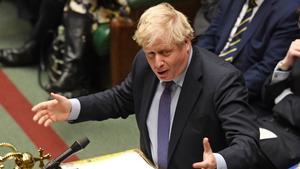 A handout photograph released by the UK Parliament shows Britain's Prime Minister Boris Johnson speaking in the House of Commons in central London on Feb 12, 2020, during the weekley Prime Minister's Questions (PMQs) session. (JESSICA TAYLOR / AFP / UK PARLIAMENT)
A handout photograph released by the UK Parliament shows Britain's Prime Minister Boris Johnson speaking in the House of Commons in central London on Feb 12, 2020, during the weekley Prime Minister's Questions (PMQs) session. (JESSICA TAYLOR / AFP / UK PARLIAMENT)
BRUSSELS - UK Prime Minister Boris Johnson told the European Union he’ll walk away from the negotiating table in June if it’s not clear he’s going to get a Canada-style free trade agreement for the UK. The pound fell.
The UK’s negotiating mandate for the next stage of Brexit, published Thursday, was in many areas close to what the EU published on Tuesday. The main differences were around how closely the UK has to stick to EU regulations - the so-called level playing field, how the deal will be structured and governed, and fishing rights in UK waters.
ALSO READ: UK PM Johnson asserts control over govt, finance minister quits
“It is a vision of a relationship based on friendly cooperation between sovereign equals,” the government said. “With both parties respecting one another’s legal autonomy. The government will not negotiate any arrangement in which the UK does not have control over its own laws and political life.”
Britain will assess in June whether the talks with EU are on course to succeed, and then decide whether to continue or to “focus solely” on preparing to leave the EU’s regulatory orbit without a deal on Dec 31
The UK is setting a tough timetable for the negotiations, saying it wants the broad outline of an agreement by June, so the deal can be finalized by September. Britain will assess in June whether the talks are on course to succeed, and then decide whether to continue or to “focus solely” on preparing to leave the EU’s regulatory orbit without a deal on Dec 31.
The pound fell after the document was released, erasing gains against the dollar and extending losses against the euro.
“We want the best possible trading relationship with the EU, but in the pursuit of the deal, we will not trade away our sovereignty,” Cabinet Office Minister Michael Gove told the House of Commons on Thursday.
Competing Aims
Brexit negotiator Michel Barnier on Thursday noted Britain’s negotiating mandate published earlier but, making clear sharp divergences ahead of talks starting next week, said the bloc would stick to the political declaration agreed last year.
“We take note of the UK’s mandate published today and will discuss our respective positions on Monday,” Barnier said in a tweet.
Brexit negotiator Michel Barnier on Thursday noted Britain’s negotiating mandate published earlier but, making clear sharp divergences ahead of talks starting next week, said the bloc would stick to the political declaration agreed last year
“We will stick to all our prior commitments in the Political Declaration. We want an ambitious & fair partnership with the UK in the future.”
In October last year the UK and EU agreed on the declaration setting out the framework for the future relationship between the EU and Britain.
The declaration addresses the security partnership and the economic partnership, with the latter referring to a level playing field of standards and regulations to ensure fair competition in trade. The UK has since rejected this.
The competing UK and EU documents show where the arguments will be after talks start on Monday. The EU argues Britain’s size and proximity means simply replicating the agreement with Canada is unreasonable. The UK argues that size and proximity aren’t necessarily a factor in trade talks.
“Geography is no reason to undermine democracy,” Cabinet Minister Michael Gove told Parliament. “To be clear, we will not be seeking to dynamically align with EU laws, on EU terms governed by EU laws and EU institutions.”
READ MORE: UK's Johnson seeks extra boost in infrastructure spending
While the EU sees June as a stock-taking opportunity, it has said it will keep trying to get a deal until the last possible moment.
In another potential sticking point, the UK said it won’t agree to EU institutions, including the bloc’s Court of Justice, having jurisdiction in the UK.
To the EU, that marks a shift from the commitments Britain made in the Political Declaration, the non-binding part of its Withdrawal Agreement with the bloc. The UK wants the right to have it own policy on subsidies and tax and to refuse any European Court of Justice jurisdiction. This would make it impossible, under European law, for the EU to enforce any deal in which the UK pledged to follow the bloc’s state aid rules after Brexit.
The details of the UK mandate show that, on financial services, it’s not looking for a closer relationship than a non-EU country would expect. But Britain does want safeguards against the EU suddenly withdrawing the right for UK financial services companies to trade in the bloc.
With Reuters inputs


